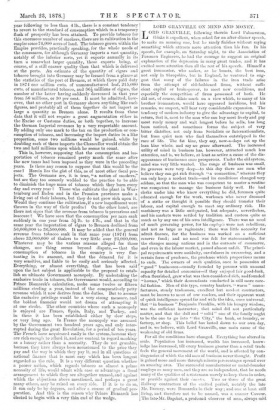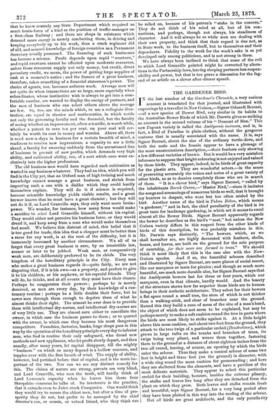LORD GRANVILLE ON MIND AND MONEY.
LORD GRANVILLE, following therein Lord Palmerston, thinks it expedient, when asked for an after-dinner speech, to make an amusing one, but he rarely finishes without saying something which attracts more attention than his fun. In his speech, for example, on Saturday night., to the Association of Foremen Engineers, he had the courage to suggest an original explanation of the depression in many great trades, and it has excited more attention than all the rest of his speech. Himself a great ironmaster, who makes, as he boasts, the best iron, not only in Shropshire, but in England, he ventured to sug- gest that many of the failures in the iron trade arise from the attempt of old-fashioned firms, without suffi- cient capital or brain-power, to meet new conditions, and especially the competition of firms possessed of both. He did not, of course, dilate much on a view which, to many of his brother ironmasters, would have appeared invidious, but his remarks, we suspect, will bear very considerable expansion. The tendency of modern industry to give the advantage to capital, to return, that is, most to the man who can buy most freely and pay most ready money and wait longest before he sells, has long been noticed, and sometimes forms the subject of very bitter diatribes, not only from Socialists or Internationalists, but from quiet men who find themselves outstripped in the race of life. The fat kine, they say, now-a-days eat up the lean kine whole, and say no grace afterward. The increased utility of mind in business has, however, attracted much less attention, and is, we believe, at least as active a cause of the dis- appearance of businesses once prosperous. Under the old system, mind was very little wanted. The range of business was small, its grooves were very deep—to this day there are men who believe they can get rich through " a connection," whereas they can only keep a modest trade—and its conditions changed very seldom, so that the man who was competent to master a routine was competent to manage the business fairly well. Ile had clerks under him who knew everything he did, foremen quite educated enough for the work, workmen who never dreamed of a strike or thought it possible they should transfer their labour, and capital enough to meet any ordinary risk. His machinery was a little antiquated, but adequate, nevertheless, and his markets were settled by tradition and custom quite as much as by any use of his own intelligence. There was no need of much governing power, for his employes were not rebellious, and not as large as regiments ; there was little necessity for adroit finance, for the business was worked on a sufficient reserve fund ; and no need was felt for statesmanship, for the changes among nations and in the currents of commerce, and even in the labour market, passed almost unfelt. The princi- pal requirements were assiduity, carefulness in overseeing, and a certain form of prudence, the prudence which proportions means to ends. The owners of such qualities, once in possession of "good " businesses—usually founded by persons with unusual capacity for detailed economies—if they enjoyed fair good-luck, often flourished, grew what was then considered rich, and founded " houses," which their descendants conducted in still more care- ful fashion. Men of this type, country bankers, " warm " manu- facturers, steady tradesmen, excellent but modest contractors, must be known to most of onr readers, and their apparent want of quick intelligence spread far and wide the idea, once universal, that " in business " Benjamin Franklin, with his hungry wisdom, was the sufficient instructor ; that mind did not particularly matter, and that the dull and " solid " one of the family ought to be the one to go into " the City," the bank, or foundry; or factory, or shop. This belief has lasted down to our own day, and is, we believe, with Lord Granville, one main cause of the weakening of old firms.
For all the conditions have changed. Everything has altered in scale. Population has increased, wealth has increased, know- ledge has increased, till every business greater than a retail trade feels the general movement of the world, and is affected by con- tingencies of which the old men of business never thought. Profit is gained more and more through minute per-centages spread over an amazing area. The successful manufacturer or metal-founder employs so many men, and they are so independent, that he needs many of the qualities of a statesman merely to keep them in order, or provide against their emcutcs. Two or three of the great Railway contractors of the excited period, notably the late Mr. Brassey, were Bismarcks in their way ; and one at least still living, and therefore not to be named, was a coarser Cavour. The late-Mr. Bagehot, a profound observer of men, always said
that he knew scarcely any State Department which required so much brain-force of a kind as the position of traffic-manager on a first-class Railway ; and there are shops in existence which demand more energy in merely conducting them, in driving and keeping everybody up to his work, than a crack regiment did of old, and as much knowledge of foreign countries as a Permanent Secretary usually possessed. The financing of such businesses has become a science. Profit depends upon rapid " overturn," and rapid overturn cannot be effected upon moderate resources, unless those resources supply not only money, but credit, direct pecuniary credit, we mean, the power of getting large supplies of cash at a moment's notice ; and the finance of a great business, therefore, takes something of a financial statesman's power. The choice of agents, too, becomes arduous work. Average men will not quite do when transactions are so large, more especially when subordinates, whose instinctive wish is always to get into a com- fortable routine, are wanted to display the energy of partners, and the men of business who can select others above the average are few. So, too, are the minds which, to use a collegiate illus- tration, are equal in classics and mathematics, in which reside not only the governing faculty and the financial, but the faculty of seeing whether an improvement, often scientific, is worth while, whether a patent to save ten per cent. on your coal will cer- tainly be worth its cost in money and worries. Above all, there is need now-a-days in business for a certain breadth of mind, a readiness to receive new impressions, a capacity to see a little ahead, a faculty for swerving suddenly from the accustomed line of business in pursuit of new profits, which demands very high ability, and cultivated ability, too, of a sort which once went ex- clusively into the higher professions.
The old business men would have regarded such cultivation as wasted in any business whatever. They had an idea, which you will find in the City yet, that an Oxford man of high training and much knowledge cannot manage a great business, and shrink from importing such a one with a dislike which they could hardly themselves explain. They will do it if science is required, because scientific knowledge yields visible results, and a great brewer knows that he must have a great chemist ; but they will not do it if, as Lord Granville says, they only want more brain- power. We wonder, for instance, how many firms would make a sacrifice to select Lord Granville himself, without his capital. They would either not perceive his business force, or they would dread it, and keep away from a man who would make themselves feel small. We believe this distrust of mind, this belief that it is too good for trade, this idea that a chopper must be better than a razor for any work, is at the root of the difficulty, but it is immensely increased by another circumstance. We all of us forget that every great business is sure, by an irresistible law, sooner or later to be jobbed. Weak men, or comparatively weak men. are deliberately preferred to be its chiefs. The very kingdom of the hereditary principle is the City. Every man who makes a great business regards it—quite fairly, we are not disputing that, if it is his own—as a property, and prefers to give it to his children, or his nephews, or his especial friends. They will do, he thinks, and at all events they must have their chance. Perhaps he exaggerates their powers ; perhaps he is merely deceived, as men are every day, by their knowledge of a cus- tomary routine ; perhaps he a little doubts their force, but be never sees through them enough to deprive them of what he almost thinks their right. The utmost he ever does is to provide them with intellectual dry-nurses, and intellectual dry-nurses are of very little use. They are almost sure either to conciliate the owner, in which case the business passes to them ; or to quarrel with the owner, in which case they become his most dangerous competitors. Foundries, factories, banks, huge shops pass in this way by the operation of the hereditary principle every day to inferior men, who find in routine their only safeguard, who dread new methods and new appliances, who let profit slowly depart, and then usually, after many years, let capital disappear, till the mighty " business " on which so many depend is a hollow concern, and topples over with the first breath of wind. The supply of ability, however, had perished before that of capital, and is the more im- portant of the two. Nor can we see any distinct remedy for this. The claims of nature are strong, parents are very blind, and Lord Granville, who sees the truth, will hardly think of Lord Leveson's capacity when he leaves him those four Shropshire concerns he talks of. So inveterate is the practice, that it extends even to Joint-stock Companies. One would think they would try to secure the ablest men, but after a time of pro- sperity they do not, but prefer to be managed by the chief director's son, or cousin, or valued friend, who they think can be relied on, because of his patron's "stake in the concern." They do not think of his mind at all, but of his con- nections, and perhaps, though not always, his steadiness of character. And it will always be so while men are dealing with their own property, and think that their regard is due not, as in State work, to the business itself, but to themselves and their dependants. Fidelity to the work for the work's sake is as yet developed only among politicians, and is not strong in them.
We have always been inclined to think that some of the evil to which Lord Granville pointed might be corrected by altera- tions in the Partnership laws, leaving sleeping partners less respon- sibility and power, but that is too grave a discussion for the fag- end of an article on a clever after-dinner speech.



































 Previous page
Previous page